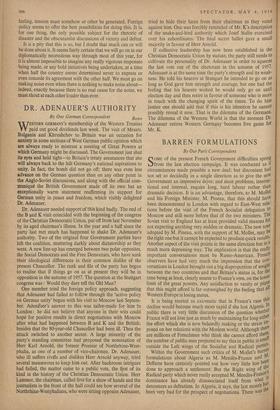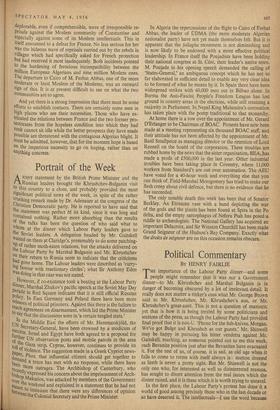BARREN FORMULATIONS
By Our Paris Correspondent SOME of the present French Government difficulties spring from the last election campaign. It was conducted as if circumstances made possible a new deal; but discontent had not sdt so decidedly in a single direction as to give the new Government an impressive drive; and most problems, interna' tional and internal, require long, hard labour rather than dramatic decision. It is an advantage, therefore, to M. Mollet and his Foreign Minister, M. Pineau, that this should have been demonstrated in London with regard to East-West rela tions before the visit of the French Socialist delegation to Moscow and still more before that of the two ministers. The Soviet visit to England has at least provided valid reasons for not expecting anything very sudden or dramatic. The new tone adopted by M. Pineau, with the support of M. Mollet, may he the right one but it cannot be expected to produce quick results. Another aspect of the visit points in the same direction but in a much more depressing way. The implication is that the really o important conversations must be Russo-American. French observers have had very much the impression that the con' versations in London brought out a big disproportion of weight between the two countries and that Britain's status is, for the time being at least, clearly nearer to France's own, on the lower limit of the great powers. Any satisfaction to vanity or pic111,e, that this might afford is far outweighed by the feeling that all Western Europe is losing status. It is being treated as axiomatic that in France's case this decline would become much more rapid if she lost Algeria. In public there is very little discussion of the question whether France will not lose just as much by maintaining for long either the effort which she is now belatedly making or the strain posed on her relations with the Moslem world. Although there are millions of Frenchmen who think she cannot afford there; the number of public men prepared to say this in public is small outside the Left wings of the Socialist and Radical parries' Within the Government such critics of M. Mollet's barren formulations about Algeria as M. Mendes-France and M.: Defferre have certainly pointed out how very little has bee," done to approach a settlement. But the Right wing of el! Radical party which never really accepted M. Mendes-France.; dominance has already disassociated itself from what it denounces as defeatism. In Algeria, it says, the last month bas been very bad for the prospect of negotiations. There was tu deplorable, even if comprehensible, wave of irresponsible re- prisals against the Moslem community of Constantine and especially against some of its Moslem intellectuals. This in itself amounted to a defeat for France. No less serious for her was the hideous wave of reprisals carried out by the rebels in villages which had specifically asked for French protection but had received it most inadequately. Both incidents pointed to the hardening of ferocious incompatibility between the million European Algerians and nine million Moslem ones. The departure to Cairo of M. Ferhat Abbas, one of the more moderate or least Moslem of the Moslems, was an outward Sign of this. It is at present difficult to see on what the two communities are to agree.
And yet there is a strong impression that there must be some efforts to establish contacts. There are certainly some men in high places who see their necessities. Those who have ex- tricated the relations between France and the two former pro- tectorates from the hopeless condition into which they had sunk cannot sit idle while the better prospects they have made Possible are threatened with the contagious Algerian blight. It must be admitted, however, that for the moment hope is based on the imperious necessity to go on hoping, rather than on anything concrete.











































 Previous page
Previous page